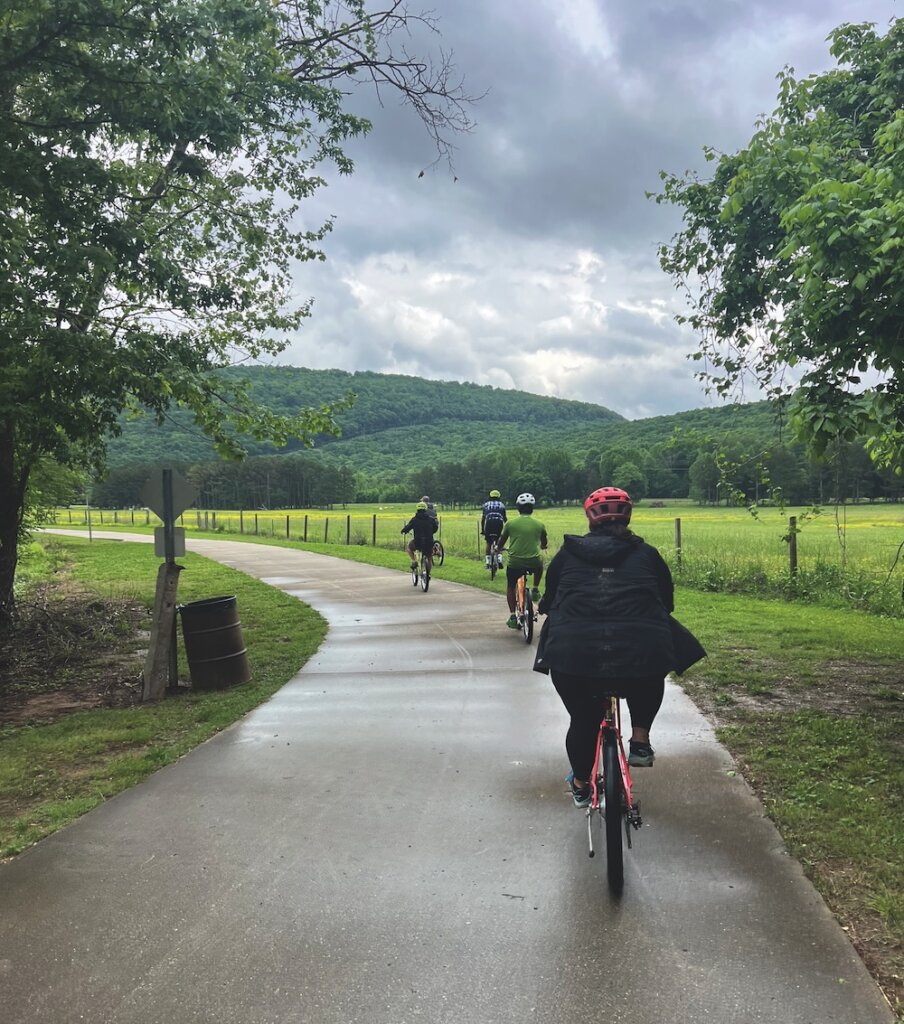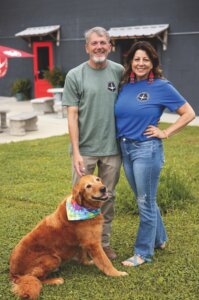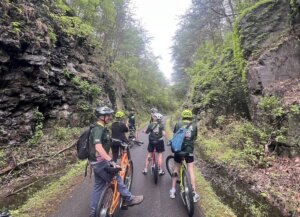
It’s a crisp spring morning as I pedal along the Chief Ladiga Trail on a group ride with the Rails to Trails Conservancy. Alabama’s first rail-trail corridor, this paved pathway begins at the Georgia state line and stretches nearly 40 miles through Piedmont, Jacksonville, Weaver and Anniston, tracing a former CSX rail line.
Having just crossed the state line, I already feel accomplished only 10 miles into our journey, which began on Georgia’s Silver Comet Trail in neighboring Cedartown. After a celebratory photo and water break, our lunch stop awaits further down the trail at Piedmont’s new Pinhoti Pizza Company.
For the next 15 miles, the promise of a warm slice of pizza stays on my mind as we cycle through Talladega National Forest, with expansive views of rolling farmland, meandering Terrapin Creek, and the outline of Dugger Mountain painting the Northeast Alabama skyline.
When I last rode the Chief Ladiga Trail a few years ago, there were no local restaurant options to enjoy after a long day’s ride. Instead, I settled for fast food on my drive back to Birmingham. That all changed last November when Piedmont natives Kevin and Maggie Cunningham launched Pinhoti Pizza, becoming the first business owners to open shop directly on the trail.

For the husband-wife duo, opening a homegrown business catering to outdoor enthusiasts felt like a full-circle moment. As a teenager, Maggie worked in her family’s hardware store, located on the very property where Pinhoti Pizza now stands. Kevin, meanwhile, owned a rock climbing and kayaking business in Huntsville for more than a decade, always dreaming of channeling his passion for the outdoors into a business that supported his hometown.
Conveniently situated parallel to Piedmont’s Main Street and facing the Chief Ladiga, the restaurant has become a gathering place for locals and trail users alike, serving up sizzling pies alongside a variety of salads, sandwiches and desserts. Kevin’s outdoor influence is reflected in the restaurant’s rustic interior, with trail maps and outdoor gear adorning the walls.
While the restaurant overlooks the Chief Ladiga Trail, it’s named after another major trail in Piedmont’s backyard — the Pinhoti Trail, a long-distance backpacking route stretching 335 miles from Alabama to Georgia that connects hikers directly to the Appalachian Trail.
Together, these two trail systems — along with nearby Terrapin Creek, a scenic waterway offering Class I–II rapids and drawing around 130,000 users each season — position Piedmont as an emerging outdoor recreation destination for both adventurers and entrepreneurs.
“Anything you want to do outside, you can do it right here in Piedmont,” says Maggie Cunningham. “We offer what I like to call the outdoor trifecta — you can hike the Pinhoti Trail, bike the Chief Ladiga Trail, and paddle or float down Terrapin Creek.”

The Cunninghams’ local business influence extends beyond Pinhoti Pizza. The couple also operates Main Street South, a vendor mall featuring men’s and women’s fashion, antiques, outdoor gear, baby gifts and accessories located in an adjacent building on the same property.
To further activate their two-and-a-half-acre trail-side footprint, they’ve hosted several large-scale events, including the Piedmont Strawberry Festival. With four years under its belt, the event has drawn as many as 4,000 attendees, nearly rivaling the city’s population of 4,400.
Attracting more outdoor users to Piedmont will require a continued investment in infrastructure, a concept that Kevin believes is starting to catch fire. New establishments include a steady influx of Airbnb options and the opening of Elevated Grounds coffee shop, coupled with a mix of long-standing Terrapin Creek outfitters who have served the waterway for decades.
“If we can get visitors to stop in Piedmont after enjoying one of our trails, they might also shop, eat, and stay overnight — if there are enough places to accommodate them,” adds Kevin. “People are starting to see bikes parked outside of our restaurant and connect the dots about what Piedmont can become. It’s a beautiful place and we want to grow it the right way while respecting our natural resources.”
Elkmont’s Rail-Trail Momentum
On day two of our ride, we traveled two hours northwest to Elkmont, a small Limestone County town just south of the Tennessee border. Like Piedmont, Elkmont sits at the heart of a rail-trail corridor, the 10.7-mile Richard Martin Trail.
Named after local trail advocate Richard Martin, who lives directly off the trail, it follows what was initially the Tennessee & Alabama Central Railroad and connects the towns of Athens, Elkmont and Veto. Along the way, trail users pass wildflower meadows, wetlands, covered bridges, Civil War sites and historic homes. Elkmont is conveniently located at the trail’s midpoint, where a refurbished red caboose and historic train depot pay homage to Elkmont’s history and a crop of local businesses line the street just steps away from the trail.
Before Elkmont native Jada Miller opened her boutique, Bliss & Birch, last October, she didn’t fully appreciate the trail’s impact until she experienced it firsthand as a business owner.
“It’s easy to overlook what’s right in front of you when you’re growing up,” Miller says. “But after opening my shop, I saw how many people were using the trail — on bikes, horses, even walking — and stopping in. They probably wouldn’t have found me otherwise.”
Bliss & Birch offers women’s casual and formal wear and features a mix of local vendors who sell handcrafted gifts and home goods, along with an upstairs photography studio. Miller is even exploring opportunities to expand her product line to include activewear tailored to trail users.
“I’ll try anything once,” she says. “That’s what I’m here for — to serve my community.”

After trail users work up an appetite, they often head to Warehouse Pizza or Gin House Barbeque, two popular local restaurants owned by Anna Boger. Whether it’s a wood-fired pie or pulled pork sandwich, these eateries have become reliable pit stops for hungry trail enthusiasts.
Like Piedmont, Elkmont’s abundant natural resources are ripe for outdoor infrastructure and economic growth. The Richard Martin Trail is one segment of the Singing River Trail, a planned 200-plus-mile greenway system across North Alabama. Nearby, paddlers can explore the Elk River along the 22-mile Limestone County Canoe and Kayak Trail, while road cyclists can tackle the 89-mile Noah Bike Trail through North Alabama’s scenic highways.
“I want all trail users — hikers, bikers, paddlers, horseback riders — to know that we’re a family-friendly town and you’re always welcome here in Elkmont,” Miller adds.
Hanlon Walsh and Cary Norton are freelance contributors to Business Alabama. Both are based in Birmingham.
This article appears in the August 2025 issue of Business Alabama.



